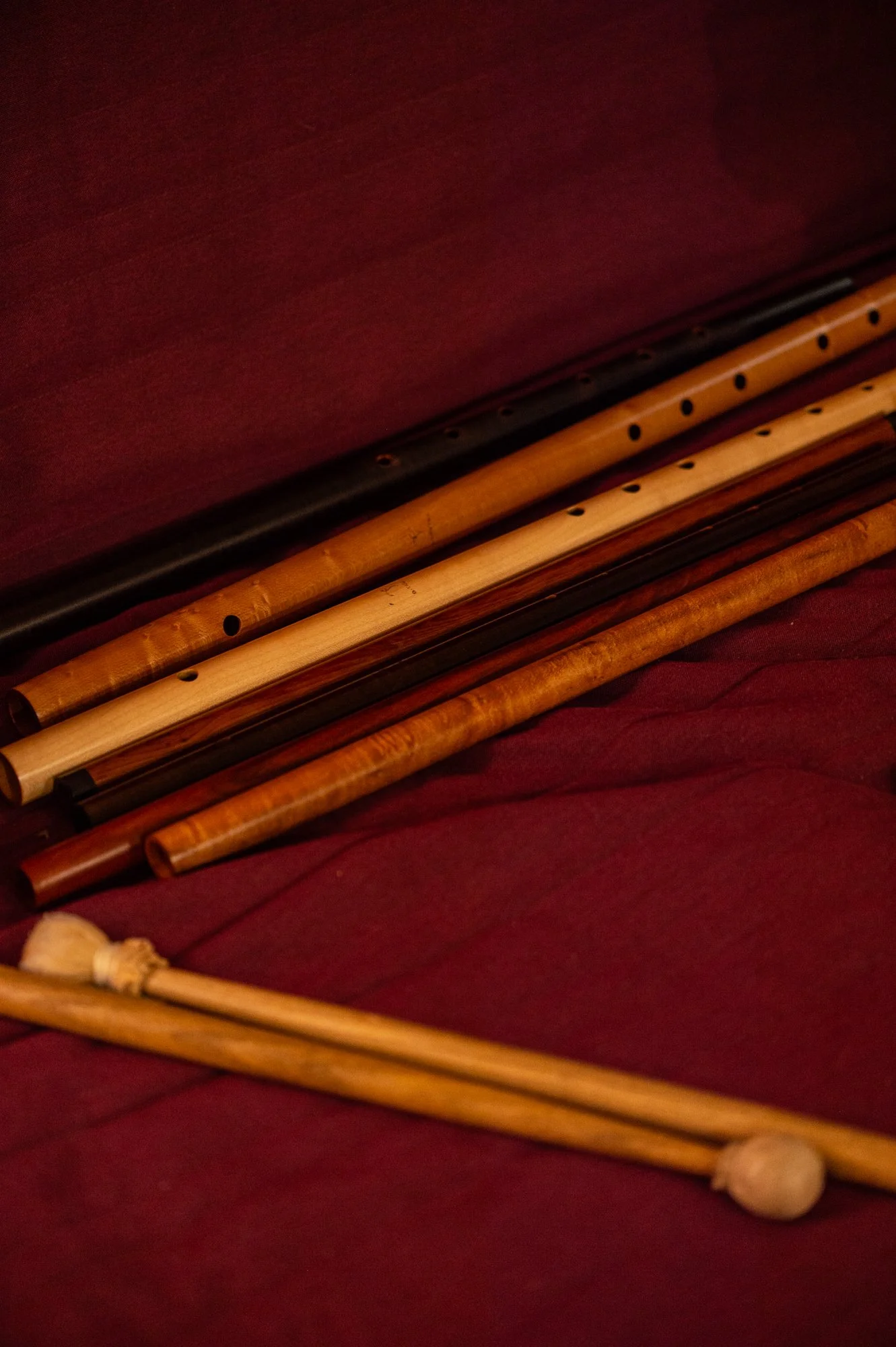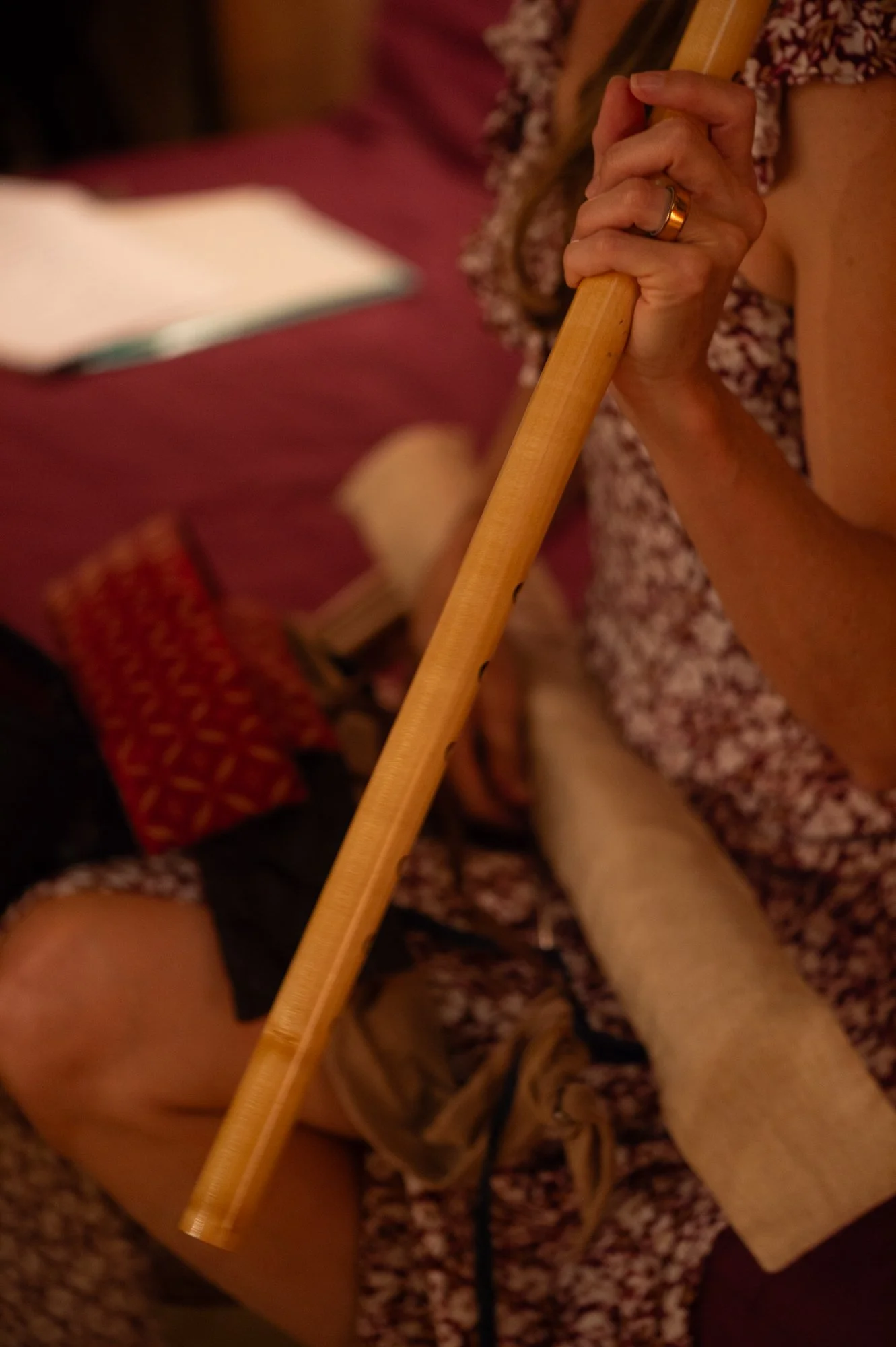About
Holly is a performer of early flutes and percussion, internationally active as a musician, ensemble director, and scholar. She has been invited to be an expert in roundtables, lectures, workshops, and jury exams, and she has performed on the stages of Festival Voix et Route Romane (France and Germany, 2025), Indianapolis Early Music Festival (USA, 2025), Greifenberg-Institut Werkstattkonzerte (Germany, 2024), Freunde Alter Musik Basel (Switzerland, 2024), Sastamala Gregoriana (Finland, 2023), Medimus (Kosovo, 2023), ReRenaissance Festival (Switzerland, 2023), and the Innsbrucker Festwochen der Alten Musik (Austria, 2022).
Since 2023 she has been Managing Director for ReRenaissance – Forum for Early Music, an arts organization in Basel, Switzerland, which premiers monthly concerts and hosts a biannual festival, all dedicated exclusively to music before 1600. Through this role she actively supports Basel’s early music community and is involved more broadly in the European Early Music Network.
As Artistic Director of Ensemble Zweigulden, she has conceived of new concert experiences which tap into the imagination and connect historical performance to modern times. This cohesive audience experience is expressed by a fan (age 38), who writes about “the layers of richness beyond the great music itself. On top of the music rests effective and interesting historical storytelling, but then it’s all bound together as an act of totally alive artistic expression with something to say about the modern world.”
Recordings
EDUCATION
Holly studied medieval and Renaissance music performance at the Schola Cantorum Basiliensis in Basel, Switzerland, completing a master's degree in 2022 with Johanna Bartz and Dr. Marc Lewon. Her research under the supervision of Dr. Martin Kirnbauer focused on the evolving transverse flute at the turn of the sixteenth century, its ensembles, and its political symbolism for Maximilian I (see link to thesis below).
Holly earned a Bachelor of Music degree in flute performance and philosophy at Wheaton Conservatory of Music in Illinois. She taught as an Artist-Educator in the Madison Creative Arts Program in Wisconsin, preparing interdisciplinary music lessons while at the same time studying topics like educational psychology and strategies of inclusion in the instrumental Music Education certification program at the University of Wisconsin-Madison.
With over twenty years of experience in teaching music lessons, Holly is a passionate promoter of communal music-making, leading her to co-found and direct the independent, non-audition Oakhurst Community Choir in Decatur, Georgia, USA, before moving to Switzerland.
Os pecadores todos loarán (Cantiga de Santa Maria 240), MS E1, fol. 218v (ca. 1284)
Hartmann Schedel’s World Chronicle (Nuremberg: Anthonien Koberger, December 23, 1493), fol. 187v. Universitätsbibliothek Basel, UBH EA I 12.
Papers and Presentations
Holly’s research focuses on the transitional transverse flute at the beginning of the 16th century and the historical flute and drum duo in all its contexts. Her passion for music education at all levels has extended into lessons, lectures, workshops, papers, and presentations.
“Hearing War: Sound, Conflict, and the Belliphonic in the Early Modern World.” Round Table Presentation and Discussion at the Medieval and Renaissance Music Conference (MedRen), Newcastle University, Durham University, and Northumbria University, England; June 30–July 4, 2025.
“Kaiserisch: The transverse flute and drum of the Landsknechte in the art of Reformation Augsburg.” Musik - Stadt - Augsburg: Zwei Jahrtausende klingende Geschichte, International Conference, Augsburg University, Germany; September 18–20, 2024 (publication forthcoming).
“The Nibelungenlied: Following the trail of an epic poem.” Medieval Music in the Dales, Bolton Castle, England; September 15, 2024.
“Build-Your-Own Estampie” Workshop. Medieval Music in the Dales, Bolton Castle, England; September 14, 2024.
“Music of the Landsknechte (Lecture-Recital).” Mini Study Day on Renaissance Military Flutes (organized by Boaz Berney – Historical Flutes). Schola Cantorum Basiliensis, 5-001. March 13, 2024. Invited presentation.
Instruments
Early music performance and research is reliant on competent and creative instrument makers, who use a mix of surviving instruments, written sources, iconography, and experimentation to refine their craft. To honor their work and equip others to find new instruments, I’ve listed my instruments below.
Medieval flutes
Medieval flute in G, maple, 440 Hz, Giovanni Tardino, 2022
Medieval flute in C, maple, 440 Hz, Giovanni Tardino, 2022
Medieval flute in D, maple, 440 Hz, Giovanni Tardino, 2022
Medieval flute in D, maple, 440 Hz, Giovanni Tardino, 2019
Renaissance flutes
Consort of four flutes, pear, 415 Hz, Giovanni Tardino, 2025
Renaissance tenor flute, maple, 440 Hz, Giovanni Tardino, 2025
Nova Zembla 1596 flute, plum, 440 Hz, Boaz Berney, 2023
Renaissance discant flute, maple, 415 Hz, Giovanni Tardino, 2020
Renaissance tenor flute, maple, 415 Hz, Giovanni Tardino 2018
Other flutes
One-hand pipe in A, 440 Hz, Jean-Daniel Talma, 2025
One-hand pipe in G Major, 440 & 415 Hz, Mark Binns, 2024
One-hand pipe in G Minor, 440 & 415 Hz, Mark Binns, 2024
Double flute in D and G, olive, 440 Hz, Giovanni Brugnami, 2022
One-hand pipe in C, 440 Hz, Giovanni Brugnami, 2021
One-hand pipe in G, 440 Hz, Jean-Daniel Talma, 2021
Native American flute, 440 Hz, 1999
Percussion
Blue tabor, Jean-Daniel Talma, 2025
String drum, Serge Cladères, 2024
Tamburelli, Paolo Simonazzi, 2023
Tabor, Miquel Tugores, 2023
Renaissance side drum, Massimiliano Dragoni, 2023
Tabor, Ermanno Vignati, 2021




